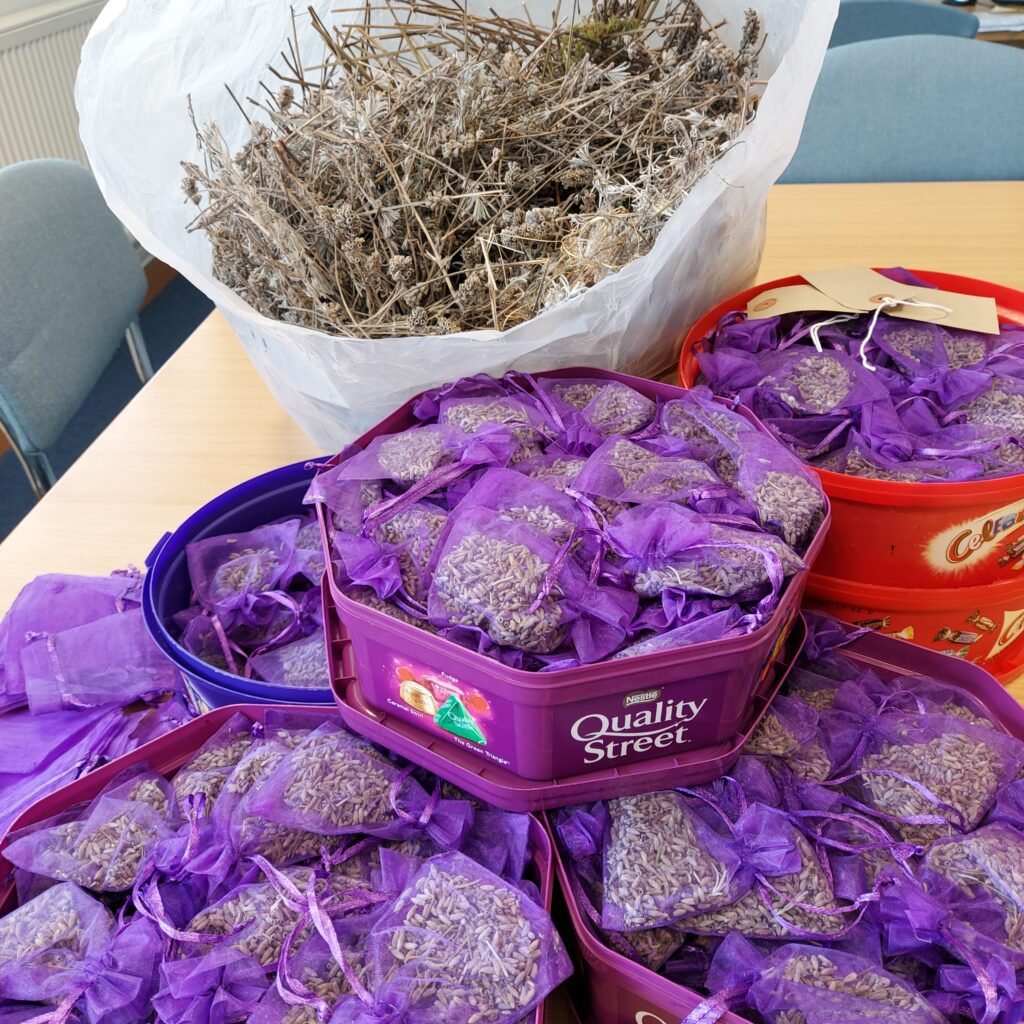Lavender — with its soft purple hues and calming fragrance — has long been a symbol of healing and wellness, and English lavender is a favourite in native planting schemes, including here at the University of Worcester. But did you know that this humble herb is also a powerhouse of health benefits? We harvest our lavender grown on campus, and give it to students in our accommodation. But as we embrace its benefits, it’s also time to think about how we package and share it, because not all that smells sweet is ethically or environmentally sound – read below about the harm of organza bags. Come to the student sustainability hub and help make ethically sound lavender bags for next year’s students.
The Healing Power of Lavender
Lavender healing has been used for centuries for its therapeutic properties. Here’s why it deserves a place in your home:
Better Sleep: Lavender’s scent promotes relaxation and improves sleep quality by increasing melatonin levels.
Stress Relief: Inhaling lavender oil or using it in aromatherapy can reduce anxiety and calm the nervous system.
Pain and Inflammation Relief: Lavender contains natural anti-inflammatory compounds that help ease muscle tension and joint pain.
Digestive Aid: Lavender tea can soothe bloating and indigestion.
Natural Insect Repellent: Dried lavender is a gentle, chemical-free way to keep moths and bugs at bay.

The Hidden Harm of Organza Bags
While dried lavender is often packaged in organza bags for sachets and gifts, these seemingly delicate pouches come with a hidden environmental cost:
- Synthetic Material: Organza is typically made from polyester or nylon — both petroleum-based plastics that are non-biodegradable.
- Microplastic Pollution: Over time, these bags can shed microplastics, contributing to pollution in waterways and soil.
- Limited Reusability: Unlike cotton or muslin, organza bags are less durable and often discarded after a single use.
The Human Cost: Worker Exploitation
Beyond environmental concerns, there’s a darker side to these pretty pouches: the risk of forced or exploitative labour in their production. Many organza bags are mass-produced in countries where workers’ rights are poorly enforced. Reports have linked parts of the textile industry — especially in regions like South Asia and China — to modern slavery, child labour, and unsafe working conditions.. Workers may endure long hours, low pay, and even physical abuse to produce cheap goods for global markets. In fact, the fashion and textile industries are among the largest contributors to modern slavery worldwide, with millions of people trapped in exploitative conditions.
A Kinder, Cleaner Alternative
If you love lavender and care about people and the planet, here are some better choices:
- Cotton or Muslin Bags: These are biodegradable, breathable, and ethically sourced options are perfect for storing dried lavender.
- Glass Jars or Recycled Tins: Great for preserving scent and keeping your home plastic-free and reducing waste.
- DIY Sachets: Make your own using upcycled fabric — a fun and sustainable craft project. Come along to the Student Sustainability Hub in the Thomas Telford building to make them. All you need is provided for free. Learn more about sustainability and the opportunities you can access whilst studying at Worcester, sign up here or scan this QR code

Lavender with a Conscience
Lavender is a gift from nature — let’s honour it by making choices that are kind to both people and the planet. Whether you’re gifting sachets, making tea, or freshening your wardrobe, choose packaging that reflects your values.

Good to know about the harms of organza bags! I had no idea.